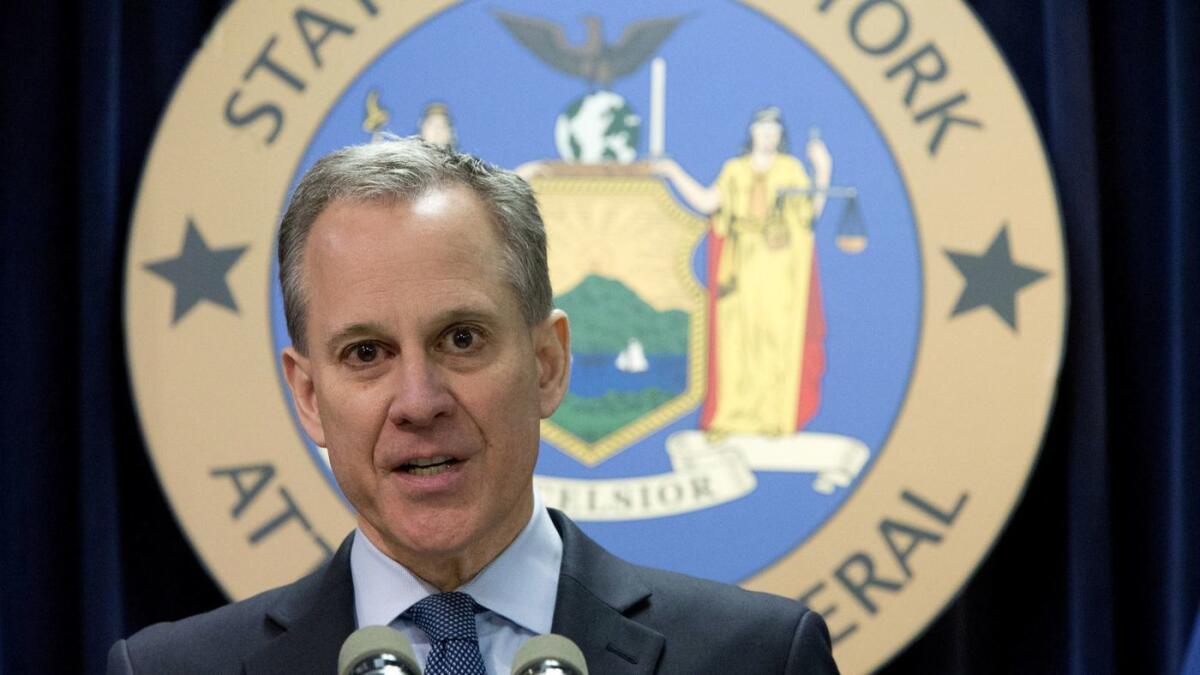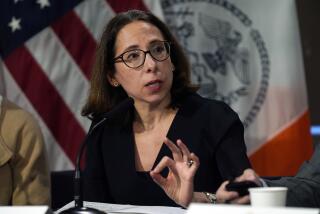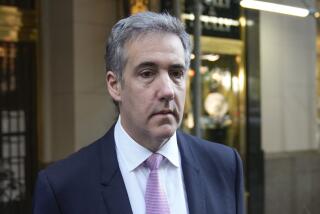Michael Cohen knew of some abuse allegations against former New York attorney general, court filing says
Reporting from Washington — Long before Eric Schneiderman stepped down as New York state attorney general amid allegations he had abused four women, Donald Trump hinted of trouble in the life of the lawman who was a thorn in his side for years.
“Is he a crook?” Trump tweeted in 2013. “Wait and see.”
At that point, Schneiderman had sued Trump University in the defrauding of students, a case Trump settled shortly after the 2016 election for $25 million. More recently Schneiderman had spearheaded legal assaults on Trump administration policies.
On Friday, a court filing in New York indicated that Trump may have known of some allegations against Schneiderman through his personal lawyer, Michael Cohen. The filing was in a federal court that is handling an unrelated investigation into Cohen’s business dealings.
Peter Gleason, a New York attorney, told the court that some records seized from Cohen during FBI raids on April 9 could involve two women who said Schneiderman had abused them.
Gleason asked the judge to prevent the identity of the women from becoming public. He later said they were not among the four women referenced in a New Yorker article that first revealed the allegations against Schneiderman on Monday. Although he resigned, Schneiderman said he would “strongly contest” the allegations.
“During my communications with Mr. Cohen I shared with him certain details of Scheinderman’s vile attacks on these two women,” he wrote in a letter to the court. “These two women’s confidentiality, as victims of a sexual assault, should be superior to that of any unrelated subpoena.”
The story of how Gleason came to tell Cohen about the allegations provides a glimpse of how political intrigue can be routed through New York, sometimes with Trump himself as a prime conduit.

Gleason wrote that his office has “an open door policy for any individual who has been victimized by entities that because of their status and power are able to destroy lives with impunity.”
In 2012 and 2013, two women approached Gleason at separate times to share allegations against Schneiderman, the top law enforcement official in the state, he wrote.
He told the judge in his letter that he believed that the district attorney’s office in Manhattan would not take the case, and he didn’t recommend that the women tell their stories to law enforcement. (Gleason has run twice against Manhattan Dist. Atty. Cy Vance, both times unsuccessfully.)
But Gleason later shared the material with Steven Dunleavy, a retired New York Post columnist known to be close with billionaire Rupert Murdoch, whose media empire has long covered Trump.
They were talking over dinner about Schneiderman’s lawsuit against Trump University when Gleason brought up the abuse allegations, he recalled in an interview on Friday.
“Trump might be interested in that,” Dunleavy responded, according to Gleason.
Soon after the dinner, Gleason said, he got a phone call from Cohen, Trump’s self-appointed fixer. He said they had never spoken before.
“Cohen had a very sympathetic ear,” Gleason recalled. “I realized, as a lawyer, he may want to use that information against his adversary.”
Schneiderman resigned Monday hours after the New Yorker published its article. One of the women allegedly abused by him was friends with Jennifer Gonnerman, a staff writer at the magazine.
The lead writer of the article, Jane Mayer, said there was no connection between Cohen and the magazine’s reporting.
“Not one source for our story on Schneiderman has any ties to Trump or Michael Cohen,” she tweeted. “Our sources all are deeply opposed to Trump and deeply disappointed that Schneiderman let them and their Cause down.”
Lawyers for Schneiderman and Cohen did not immediately respond to requests for comment.
Twitter: @chrismegerian
UPDATES:
3:50 p.m.: This article was updated with Peter Gleason’s denial that the two women who approached him were among the four cited in a New Yorker article.
This article was originally posted at 8:45 a.m.
More to Read
Get the L.A. Times Politics newsletter
Deeply reported insights into legislation, politics and policy from Sacramento, Washington and beyond. In your inbox three times per week.
You may occasionally receive promotional content from the Los Angeles Times.











